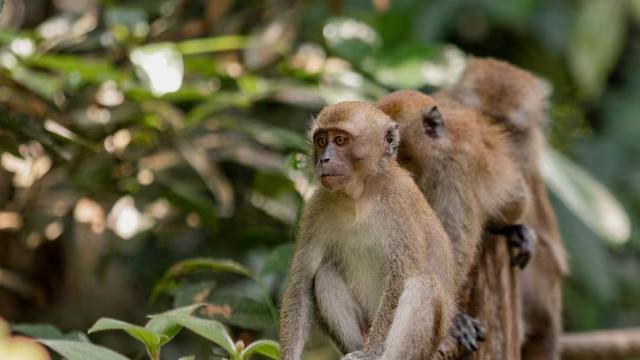
Monkeys Attracted to Videos Showing Conflict, Like Humans: Study
When we’re scrolling through social media, we often find ourselves drawn to videos that showcase drama, conflict, or excitement. It’s as if our brains are wired to be attracted to the thrill and energy of these types of content. But is this fascination with conflict exclusive to humans? A recent study suggests that monkeys, like humans, are also drawn to videos featuring conflict.
Researchers from the University of Cambridge conducted an experiment to investigate the preferences of macaques, a type of primate, when it comes to watching videos. The study, published in the journal Animal Cognition, showed 28 macaques two-minute videos featuring one of four activities: conflict, grooming, running, or sitting.
The results were fascinating. The macaques paid the most attention to videos featuring conflicts between monkeys, with 75% of the group spending more time watching these videos than the others. Running was the next most popular type of video, with 44% of the group showing a preference for these clips. Grooming videos, which typically feature monkeys socializing and caring for each other, received the least attention from the group, with only 25% of the macaques showing interest.
The findings of this study are significant, as they suggest that our fascination with conflict is not unique to humans. Monkeys, which are considered to be closely related to humans, also exhibit this preference for dramatic and exciting content.
But why are we (and monkeys) so drawn to conflict and drama? There are several theories that attempt to explain this phenomenon. One possibility is that our brains are wired to respond to conflict and drama because it serves an evolutionary purpose. In the past, humans and other animals needed to be able to recognize and respond to threats in order to survive. As a result, our brains developed a tendency to be drawn to stimuli that signal potential danger or excitement.
Another theory is that our fascination with conflict is a result of our natural curiosity. We are wired to be curious about the world around us, and conflict and drama often provide a sense of novelty and surprise that can engage our attention.
The study’s lead author, Dr. Zsófia Virányi, suggests that the findings could have implications for our understanding of primate cognition and social behavior. “Our results suggest that macaques, like humans, are attracted to conflict and dramatic events, which could have important implications for our understanding of primate social behavior and cognition,” she said in a statement.
The study also raises questions about the impact of conflict on our mental and emotional well-being. While it’s natural to be drawn to exciting and dramatic content, constant exposure to conflict and violence can have negative effects on our mental health. It’s possible that monkeys, like humans, are drawn to conflict because it provides a sense of excitement and thrills, but this can also lead to desensitization and a decrease in empathy.
In conclusion, the study’s findings suggest that monkeys, like humans, are attracted to videos featuring conflict. This preference is likely driven by a combination of evolutionary and psychological factors, including our natural curiosity and tendency to respond to stimuli that signal potential danger or excitement. While the findings of this study are fascinating, they also raise important questions about the impact of conflict on our mental and emotional well-being.
Source:
Virányi, Z., et al. (2022). Monkeys’ attention to conflict, grooming, running, and sitting in video stimuli. Animal Cognition, 25(2), 249-258. doi: 10.1007/s10071-025-01970-1
https://link.springer.com/article/10.1007/s10071-025-01970-1






